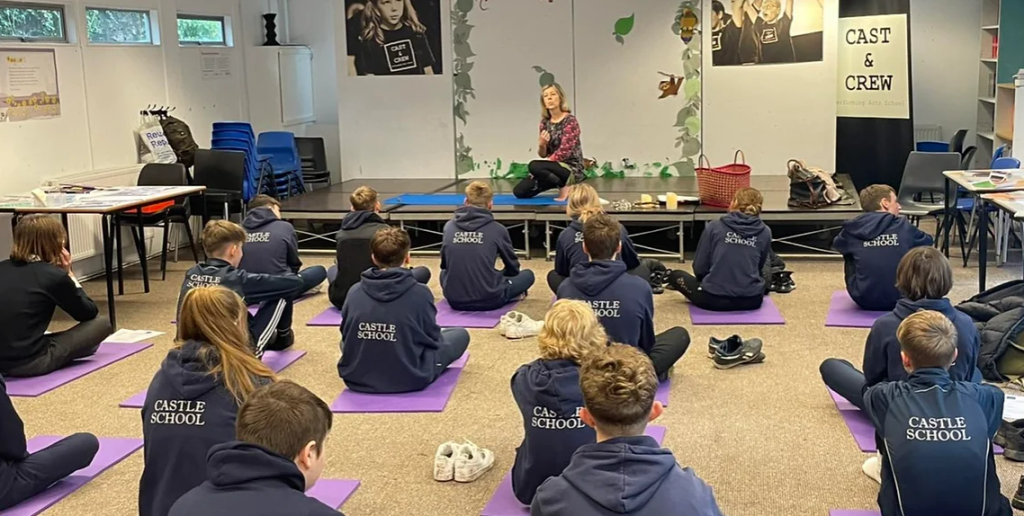Education
Castle School in Haverfordwest to close in July

CASTLE SCHOOL, a private school for children of all ages in Haverfordwest, has announced it will close at the end of this academic year, a decision that has left parents and pupils shocked and dismayed.
Principal Harriet Harrison delivered the news in an email to parents, marking the culmination of a period filled with uncertainty, leadership changes, and a steady decline in pupil numbers. This email was just days after a previous email from the school stating that it was to remain open.
She said: “If you need to focus your frustrations, disappointment and any anger please let that be at me. I am more than happy to meet with any parent to further explain this difficult decision.”
Founded in 2009 by Mrs. Harrison, Castle School carved out a niche for itself by championing a holistic approach to education, consistently delivering strong GCSE results, and fostering an inclusive, family-oriented environment.
Despite the challenges of relocation from Narberth in 2020 and navigating the complexities of the post-pandemic landscape, the school endeavored to retain the essence of its ethos, focusing on creating a safe, engaging, and thriving space for its pupils.

The school’s recent history, however, has been less than stable. The departure of the previous headmaster, Mike Hughes, was one turning point, exacerbating existing issues and contributing to a growing atmosphere of discontent among the school community.
Hughes’ exit left a void that further strained the school’s operations and morale, with many families choosing to leave in search of more stable educational environments.
In her heartfelt announcement, Principal Harrison cited several factors behind the difficult decision to close Castle School.
The loss of key leadership team members, the financial and operational challenges of managing multiple school inspections, and the unsuccessful transition to a new management model have all taken their toll.
The school’s attempt to focus on its core 3-16 provision by shutting the sixth form and nursery proved to be a tipping point for many families, leading to a critical reduction in student numbers.
The response from parents to the closure news has been one of anger and frustration. Many feel let down by the school’s leadership, voicing their concerns over the lack of communication and perceived neglect of their children’s educational welfare in these trying times. Despite Mrs Harrison’s appeal for understanding and her commitment to support the students through this transition, some parents are clearly upset.
One mum, who asked this newspaper not to be named said: “Things have been up in the air for so long, and now the school has announced it is closing I am worried if my children are going to learn anything with the lack of teachers and classes being amalgamated.
“In short this is a huge mess and I think that all the pupils are going to miss out getting a decent education this year.”
Another parent said: “This is very upsetting and very shocking, unless I move work I am not sure now where I am going to send my child in September.”
As the school community faces this upheaval, efforts are being made to ensure a smooth transition for the students.
Mrs Harrison outlined plans for the remaining months, including the amalgamation of classes and a series of celebratory and transitional events, designed to provide a sense of closure and positivity for students and staff alike.
Looking towards the future, The Herald has learned that numerous parents are exploring alternatives, with many considering Red Hill School as a viable option for their children’s continued education.
It is expected that a significant portion of Castle School’s student body will transfer to Red Hill School in September, in the hope of finding a stable and nurturing environment that aligns with Castle School’s values.
The future now remains on ensuring the well-being and future prospects of the students.
UPDATE – FEB 5, 2024
As a result of last week’s announcement, Nant-y-Cwm Steiner School in Llanycefn says it has already received a number of enquiries from Castle School families. Consequently, we will be holding an additional Open Day to accommodate the Castle School community.
A spokesperson for Nant-y-Cwm said: “We have a limited number of spaces still available, so please get in touch to book your place.”
“We feel that many of the values and educational principles that led you to choose Castle School for your child’s early years and primary education are shared with Nant-y-Cwm. We are an independent school located in a wooded valley a few miles South of Maenclochog.
“We currently have just over 80 students aged 3-14 and have limited spaces in both our early years Kindergarten (3-6) and in some classes in our main school (6-14).”
“We would be very happy to talk through any questions you may have about Nant-y-Cwm or Waldorf education as well as arrange a visit or taster for your child/ren. Please do get in contact if you think your child might benefit from what Nant-y-Cwm has to offer.”
Community
Cilgerran Church in Wales school petition to be heard

A PETITION opposing proposed changes for a north Pembrokeshire school is to be heard by councillors later this week.
At last May’s meeting, Pembrokeshire County Council considered a report of the School Modernisation Working Group which outlined the findings of a review of education provision in the Preseli area.
A later July meeting backed a general consultation to discontinue Cilgerran Church in Wales Voluntary Controlled School, and to establish it as a 3-11 community school.
“In particular, the review considered the extent of surplus school places in the area, set against a significant decline in the pupil population,” the council in its consultation has said.
The consultation closed on January 30.
Hundreds have opposed the proposed changes, with a petition, on the council’s own website opposing the changes recently closing after gaining 391 signatures.
Any petition of more than 100 signatures triggers a debate at one of the council’s scrutiny committees, in the case of Cilgerran that debate taking place at Pembrokeshire County Council’s February 5 schools and learning overview and scrutiny committee.
The Cilgerran e-petition, created by Louise Williams, raised concerns including the school could become part of a federation, a loss of permanent head teacher on site, a shared head teacher would have to oversee several schools, loss of funding control and the ability to maintain the school’s current healthy and stable funding, and a loss of commitment to the church, in turn could impact on the school’s and pupils values, beliefs and cultural beliefs.
It said: “Ysgol Cilgerran VC school has strong links with the Church community in Cilgerran and we believe this will have a negative impact on the children who attend the school, the community of Cilgerran and the links between the two.
“We are proud of our school ethos and values which are strengthened by our links with the church. The school has close and strong relationships with our Church in Wales federation governors one of which is also our safeguarding governor.
“Our Church Federation governors work closely with the school and are regular visitors to the school and the children. They provide vital support and guidance to the school and have a positive impact on the Children’s education. We believe these links will be weakened by this proposal to remove our VC status and we believe this is an un-necessary action.”
The proposals for Cilgerran are part of a wide range of potential education changes in the county.
Two petitions, opposing the potential closures of Manorbier and Ysgol Clydau schools, were recently heard at full council and a further petition opposing the potential closure of Stepaside School has recently been launched, which has generated enough support to be heard at a future council meeting.
Education
Industry insight helps marine cadets chart career course

Shipping professional visits Pembrokeshire College to showcase real-world opportunities on the Milford Haven Waterway
STUDENTS training for careers at sea were given a first-hand look at life in the maritime industry after a leading shipping professional visited Pembrokeshire College to share his experience of operations on the Milford Haven Waterway.
Toby Forester, from Williams Shipping, met with the College’s Enhanced Marine Engineering Pre-Cadets to explain how commercial shipping, marine services and logistics work together to keep one of the UK’s busiest energy ports moving.

Learners heard about the wide range of activity taking place daily on the estuary, including vessel movements, specialist support craft, safety management and the coordination required to operate safely and efficiently in a working port environment.
Staff said the session gave students valuable real-world context, helping them understand how the engineering skills they develop in workshops and classrooms directly translate into careers within the maritime and energy sectors.
The visit forms part of the College’s wider effort to strengthen links between education and industry, ensuring young people are exposed to employers and career pathways while still in training.
College representatives said experiences like this help build confidence and ambition among learners considering technical roles at sea or ashore.
They thanked Williams Shipping and Mr Forester for supporting the next generation of marine engineers and helping inspire future talent in Pembrokeshire’s coastal economy.
Photo caption: Marine engineering pre-cadets at Pembrokeshire College welcomed an industry talk from Williams Shipping about operations on the Milford Haven Waterway (Pic: Supplied).
Education
Funding axe falls on Welsh digital education scheme as £1.4m handed to English uni

Face-to-face training replaced with online resources in decision branded a ‘slap in the face’ for Wales
A LONG-RUNNING Welsh digital education programme that has trained thousands of teachers and pupils every year is facing an uncertain future after Welsh Government funding was cut and redirected to an English university.
Technocamps, a Swansea University-based project which has operated across Wales for twenty-two years, has described the decision as a major blow to digital skills development, with staff already losing jobs and schools left without in-person support.
Instead of renewing Technocamps’ funding, ministers have awarded £1.4 million under the Curriculum for Wales Grant Support Programme to the University of York to deliver mainly online learning resources, with only limited face-to-face sessions in what are described as “priority areas”.
Critics say the move risks replacing hands-on, bilingual classroom support with generic remote materials.
Each year Technocamps provides direct training to more than 900 teachers and delivers workshops to over 30,000 young people in schools across Wales, working face-to-face with pupils to improve coding, computing and digital literacy.
The programme has been widely credited with helping schools meet the growing demands of the Curriculum for Wales and tackling shortages in specialist computing skills.
‘Bitter disappointment’
Plaid Cymru MS Sioned Williams, who represents South Wales West, said she had met the Technocamps team again this month and would be writing to the Cabinet Secretary for Education seeking answers.
She said: “The necessity of good quality, face-to-face digital skills training has never been more important in this digital age.
“I’ve seen firsthand how engaging and effective a Technocamps workshop is and what makes this programme so great is that it is made in Wales, delivered bilingually through our network of universities and is able to reach every school and teacher.
“That’s why the news that Welsh Government has cut funding is so bitterly disappointing.
“At a time when Welsh universities are in financial crisis, it’s an additional slap in the face that what little funding has been allocated has gone to a university in England.”
Jobs lost across Wales
Beti Williams MBE, the programme’s founder and patron, said the funding decision had already resulted in redundancies.
She said: “The end of Technocamps funding has led to the unemployment of teacher trainers at universities across Wales, leaving nearly 1,000 school teachers who rely on our bespoke in-person training and support in limbo.
“Replacing Technocamps with predominantly standard online courses is an insult to Welsh universities. Online courses, of which there is unlimited choice, offer nothing to struggling teachers who rely on tailored, face-to-face help.”
A petition calling for funding to be restored has gathered more than 4,000 signatures and is now being considered by the Senedd Petitions Committee.
Questions over value for money
The decision has also raised questions about value for money.
According to supporters, the £1.4m grant awarded to York is almost double Technocamps’ previous annual funding, yet delivers fewer in-person services.
There are also concerns that only seven per cent of the wider Curriculum for Wales grant funding over the next three years is allocated to science and technology subjects.
Education campaigners warn that reducing practical support in computing and digital technology could widen skills gaps at a time when Wales is trying to attract high-tech industries and improve economic productivity.
Digital divide fears
Teachers have long argued that in-person training is essential, particularly for schools with limited IT expertise or rural connectivity challenges.
Technocamps staff say online-only provision risks leaving some schools behind.
Ms Williams added: “It’s so important that we keep this crucial skills and knowledge in Wales. The thought that we could lose this valuable resource makes no sense at a time when the need for digital competency has never been greater.”
Welsh Government has been asked to explain why the funding was awarded outside Wales and whether the impact on Welsh university jobs and school support was assessed before the decision was made.
-

 Health5 days ago
Health5 days agoConsultation reveals lack of public trust in health board
-

 News6 days ago
News6 days agoCaldey still unsafe, survivors warn — despite Abbey’s reform claims
-

 Community6 days ago
Community6 days agoPembrokeshire students speak at national Holocaust Memorial Day event
-

 News8 hours ago
News8 hours agoPrincess of Wales visits historic Pembrokeshire woollen mill
-

 Crime4 days ago
Crime4 days agoPembroke man accused of child sex offences sent to Swansea Crown Court
-

 News6 days ago
News6 days agoKurtz raises Gumfreston flooding in the Senedd as petition deadline nears
-

 Education6 days ago
Education6 days ago‘Vulnerable teen’ questioned by police at Milford Haven School
-

 Community6 days ago
Community6 days agoCampaign to ‘save’ River Cleddau hits over 2,200 signatures








































